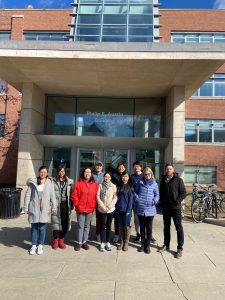Research needs data. Medical researchers rely on measurements of model organisms’ vitals to determine if a treatment could be effective; political scientists use polling data to gauge how the public feels about a policy; economists look at market data to understand and predict patterns and changes in the marketplace.
But sometimes researchers don’t have the ability to gather or understand their data in the most effective way. UConn’s Statistical Consulting Services available through the Center for Open Research and Equipment (COR²E) address this problem by providing support on research projects at the university and beyond.
The Statistical Consulting Services (SCS) provides three kinds of services: free daily in-person and virtual walk-in hours, free online consultations, and full-project involvement where consultants are assigned to a project and provide full support for as long as the researchers need.

“We hope that we can meet the variety of the analytical and statistical needs of the UConn community through providing these three levels of service,” Timothy Moore, the director of the SCS, says.
The service has existed for almost as long as the statistics major at the University of Connecticut has. The university introduced the statistics major in 1962, and in 1963 it began consultation services for research projects in other departments. While the Statistics Department has been providing services to the UConn community for years, the SCS moved into COR²E last year.
By being a part of COR²E, the SCS has a supportive administrative framework that helps make sure everyone knows about the resources it has to offer.
“It’s an important facility for the university and being in COR²E gives it some more visibility,” Dan Schwartz, director of COR²E says. “The most important thing to me is everybody who needs statistical consulting gets it and knows about the services.”
The SCS is currently staffed by a team of graduate students in the Department of Statistics who have expertise in statistical design, analysis and programming.
Those who come to the SCS for help bring a range of challenges. Some have specific questions about how to set up a survey or analyze collected data, whereas others aren’t sure where to start.
“I see it as a collaboration between ourselves, who have the statistical expertise, and the people who have questions they need help with or they want solutions to,” Moore says. “We want to make sure they’re happy while at the same time not compromising the level of statistical rigor we provide.”
The SCS helps people from nearly every department at UConn from psychology, to pharmacy, to civil and environmental engineering.
“From the university’s perspective, a thriving consulting service is an indicator of thriving research because that’s what we’re involved in: Trying to help people do better research and help them ask better questions and also answer those questions more efficiently,” Moore says.
Moore hopes to expand in-person services to UConn’s regional campuses, which can currently utilize the online services for the cutting-edge research happening throughout the state.
As research in all fields is putting a greater emphasis on data, services such as the SCS have a growing importance.
“We live in a data-centric world, so statistics and analysis of data is only becoming more important; Tim and his team make sure we stay ahead of the curve,” Schwartz says.
Sarah Reed, an associate professor in the Department of Animal Science brought her project looking at how maternal nutrition during gestation affects the proteome in the muscle of the offspring to the SCS last semester. Reed and her team, in collaboration with another COR²E resource, the Metabolomics and Proteomics Facility, had collected thousands of data points but didn’t know how to fully analyze them.
“This was 100% a new process for us,” Reed says. “What we have now is a much more rigorous analysis and I’m much more confident in our data analysis.”
The consultants at the SCS took Reed through various types of analysis and helped her understand the results. Reed is now working on getting her research ready for publication, supported by the figures and analysis the SCS provided.
“The experience I had was phenomenal,” Reed says. “They were able to explain complex statistical models and processes in a way I could understand, not being a statistician. It was really helpful.”
The SCS also offers its services to people outside the university. Recently, they began working with the Connecticut Coalition to End Homelessness to improve their survey design for tracking the number of homeless or unstably housed youths, one of the hardest populations to identify.
“I am excited to work on challenging projects, and help researchers in various fields to overcome statistical problems they encounter,” Yulia Sidi, the SCS consultant working on this project says.
In addition to their project-based consultations, the SCS holds workshops on topics including survey design, model selection and data visualization.
“That’s another service we want to use as a tool to provide more practical statistical skills to the UConn community,” Moore says.
Moore emphasizes that these services are for anyone at the University, or beyond, to utilize.
“We’re here to help,” he says.
Anyone interested in utilizing the SCS’s services should visit the group’s website or email Timothy Moore at timothy.e.moore@uconn.edu.



